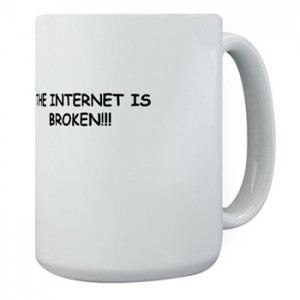
A couple of jobs back, when I still worked only in marketing, I used to joke around with an ebiz friend about which of us had the bigger “smoke and mirrors” job. I developed media kits, sell sheets and emails to promote our wares, and fought with our emedia department tooth and nail on developing the right tools for us to sell to our specific market; meanwhile, he was focused on finding new emedia products that worked on a corporate level and which the emedia department would have to implement and support across multiple markets. Neither of us had any solid metrics for what we did to really determine our effectiveness, while the sales reps depended on both of us to do our jobs well in order to effectively navigate the magical revenue stream that runs through cyberspace.
Except, of course, there is no such magical stream, as many publishers are now finding out.
Seth Godin, of whom I’m quickly becoming a disciple, isn’t a big fan of the emedia=revenue mindset that’s driving a lot of initiatives in the publishing world these days, but he’s not simply a naysayer with a soapbox, instead positing a different approach to emedia that, in his opinion, leads organically to revenue…when it’s deserved:
First, the market and the internet don’t care if you make money. That’s important to say. You have no right to make money from every development in media, and the humility that comes from approaching the market that way matters. It’s not “how can the market make me money” it’s “how can I do things for this market.” Because generally, when you do something for an audience, they repay you. The Grateful Dead made plenty of money. Tom Peters makes many millions of dollars a year giving speeches, while books are a tiny fraction of that. Barack Obama used ideas to get elected, book royalties are just a nice side effect. There are doctors and consultants who profit from spreading ideas. Novelists and musicians can make money with bespoke work and appearances and interactions. And you know what? It’s entirely likely that many people in the chain WON’T make any money. That’s okay. That’s the way change works.
Amen.
The multiple waves of layoffs that have hit the publishing industry over the past couple of months have been incredibly disheartening, if not the least bit unexpected thanks to flawed business models, and having a job at this point has effectively become the new merit raise, but there’s one group of people who have mostly been insulated because they were supposed to be the saviors. Whether they’re called ebiz, emedia, or some of the less kindly names I’ll skip for now, it’s the one area that’s seen major investment in many traditional publishing companies in recent years, but for the most part, to little effect.
Now, according to Folio:, they, need to start watching their backs, too:
CondeNet might be the most dramatic example, cutting more than three dozen online staffers as well as most of the Portfolio.com staff and pulling back on most of the site’s original content.
The problem for consumer publishers is the financials. While publishers have long spoke of online revenue being smaller but more profitable, it’s hard for larger publishers with six-figure (or more) print deals to be excited about five-figure online deals. In a recent article on Slate.com’s Big Money, Lesley Blume wrote that one media expert estimates that an online CPM is worth between one-seventh and one-tenth of a print CPM. “That means that swapping out online-for-print publication right now literally amounts to trading in dollars for pennies—which is hardly an alluring prospect for publishing companies used to commanding lavish ad revenues.”
Hearst has aggressively pursued a digital strategy and purchased online companies such as UGO.com, ECRush.com and Kaboodle. While CEO Cathy Black told FOLIO: last year that she spent 20 percent of her time on digital, print still paid the bills. “The numbers that are trotted out are that 4 percent or 5 percent of [mass consumer magazine revenue is digital] but we’re not there yet,” Black said. “Digital still for us is the tail wagging the dog.”
“Dollars for pennies.”
Ouch!
PS: My aforementioned ebiz friend definitely had the bigger smoke and mirrors job. 😉
Do you like email?
Sign up here to get my bi-weekly "newsletter" and/or receive every new blog post delivered right to your inbox. (Burner emails are fine. I get it!)

